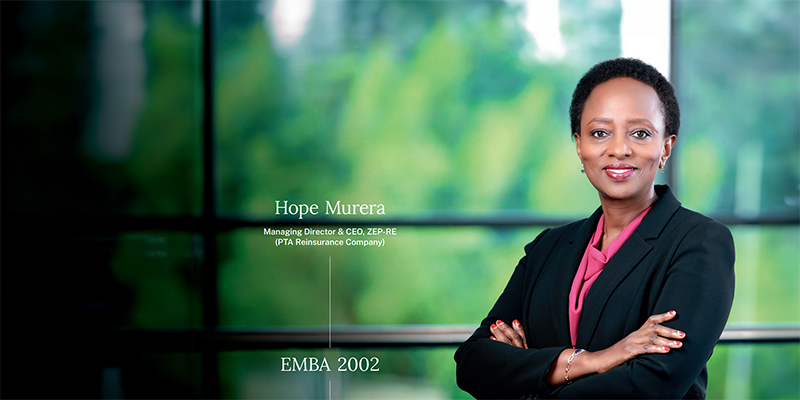
What is the real problem you need to solve?
Addressing this question is a core discipline at the heart of IMD teaching. The theme recurs in interviews with alumni. It is beguiling: seemingly elementary, yet fundamental. Amid the continual noise that confronts the executive, she or he has to constantly evaluate: what is the real problem here?
For Hope Murera, her natural intellectual strength and curiosity honed this discipline, enabling her to transfer insights from the EMBA learnings and the various Discovery Expeditions, especially to Silicon Valley, to create innovations back home.
“The biggest lesson was creating impact. It’s not just the numbers. And guess what? The numbers follow”
As CEO of ZEP-RE, a major reinsurance company in Africa, headquartered in Kenya, she has pioneered initiatives that have begun not only to help business growth, but economic development.
This began with taking a big picture, recognizing that insurance penetration on the African continent is low, and posing the question: who are the predominant economic actors, and whose business needs do we serve? The proportion of SMEs, and of businesses in the agricultural sector – often affected by drought linked to climate change – is high.
“It was [the visit to] IDEO during our Silicon Valley Discovery Expedition… and the conversations I had with my professors at IMD that led me to think about: What is the problem that we need to solve?”
The IMD approach is rigorous, covering “the ideation, the brainstorming, the testing, … You know, it’s a practical thing and has become a way of life”.
With 65% of the African population employed in agriculture, Hope and her team have developed products that protect smallholder farmers including herders of cattle, traditionally with a nomadic lifestyle. This includes working with banks to derisk lending to this sector and connecting farmers to markets.
She is focused on building resilience and sustainability for these communities in the face of severe climate change and moving beyond subsistence to accessing the Middle East live animal and Halal meat market.
Another important feature of the African economy is the high proportion of SMEs (small and medium-sized enterprises), many run by women and young people. This segment is seen as most risky and is therefore unable to access affordable financing for their business. Hope tells a moving story about a brilliant entrepreneur, who teamed with an engineer to recycle waste cooking oil from hotels to manufacture fuel that they sold to flower farms, of which there are many in Kenya. But he was uninsured – his plant burned down and he had to begin all over again.
ZEP-RE now has as a growing proportion of its portfolio, micro insurance for both the life assets and the credit-worthiness of an individual – a package known as the credit life.
In the property sector Hope has crafted an ingenious innovation. It involves ZEP-RE guaranteeing the deposit on a purchased home for a first-time buyer. Thousands of households with a steady income are compelled to rent a home, and find it difficult to save for the deposit on home purchase – the bank will typically ask for 20% of the purchase price as a deposit. The insurance product offers a guarantee to the bank to cover the 20% in the event of a default, and in return the bank issues a 100% mortgage, with the home-owner contributing both insurance premiums and repayments.
The service provides a social good, but it is enlightened self-interest by the insurer: the initiative promises to encourage house-building and home ownership, growing the aggregate demand for insurance services. So far, a few thousand householders have benefited, and the target is
for 100,000. The default rate is low.
The combination of social purpose and strong commercial returns comes naturally. As she told the EMBA class of 2022, as guest speaker: “Wherever you go, leave a much better place, and together, we can leave a much better world.”
In the interview for this profile, she adds: “The biggest lesson [from IMD] was creating impact. It’s not just the numbers. And guess what? The numbers follow.”
Hope, who is Rwandan, was on one of the early cohorts on the EMBA, and speaks with warmth of her time in Lausanne.
Her role at the time was Managing Director of Sonarwa, a Rwandan insurer, and her EMBA empowered her to move to Kenya and ZEP-RE, first as the Corporate Secretary, then Deputy CEO and CEO of ZEP-RE in 2017. The company operates in 50 African countries, with offices in nine of them.
“Wherever you go, leave a much better place, and together, we can leave a much better world”
In common with many IMD alumni, she has forged such close bonds with her fellow course participants that they arrange annual meet-ups. The Kenyan franchise of IMD Global, as it were, is strong and growing, she reports: “We actually have very many members. My class of 2002 meets regularly and will be in Nairobi in Summer of 2025.”
While the business network is undoubtedly beneficial it is the learning, first and foremost, that stays with her, centering on the question of the principal problem to be solved. This, of course, is just a first step: the next is to create solutions. From helping smallholding farmers to boosting home ownership, she has crafted solutions that contribute to economic development.
Her parents were prescient when they selected the name Hope.


